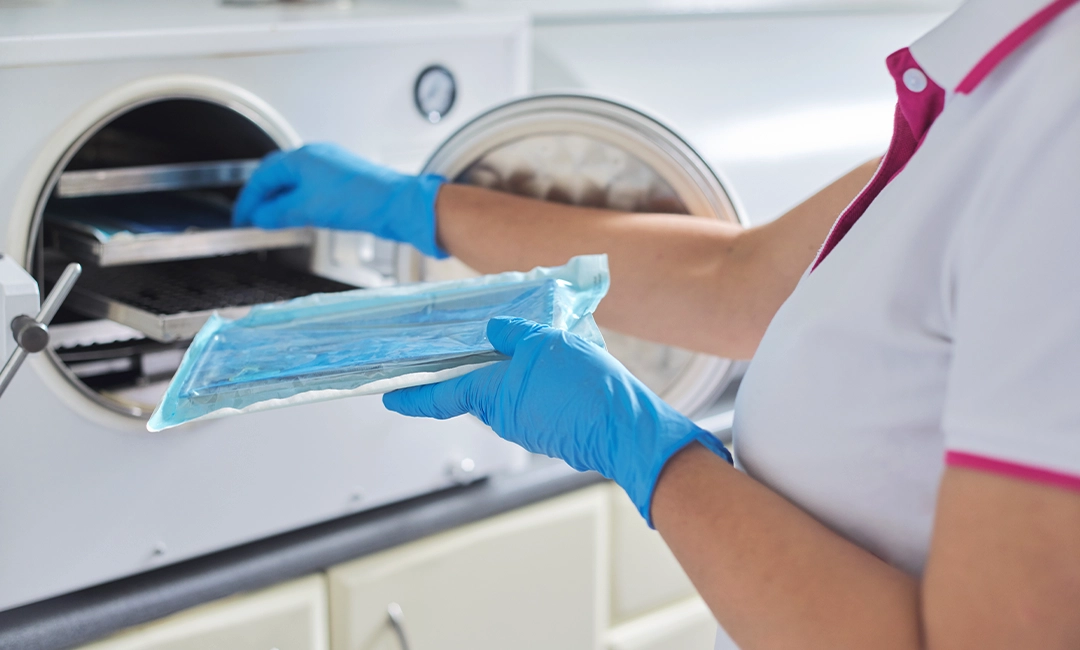Summary of Key Points
- Dental assistants are vital in preparing patients for oral surgery from beginning to end.
- A key part of preparing a patient for oral surgery is to make them feel comfortable and safe in a clean environment.
- A dental assistant may run into problems when preparing a patient for oral surgery, such as dental anxiety, time management issues, or risk of infection.
- Overcoming these issues can start with empathy, superior organizational skills, and being competent in sanitizing procedures. You can learn these skills and more in Risio’s Dental Assistant Distance Delivery Diploma Program.
Dental assistants are an integral part of dental practices and have many responsibilities when it comes to preparing patients for oral surgery. Dental assistants help oral surgeons during procedures by providing support that makes the work efficient and orderly.
Preparing a patient for oral surgery has specific steps to make sure the patient is comfortable both mentally and physically. Proper care and consideration is also necessary when preparing any instruments that will be used in these procedures.
This article outlines the steps of what preparing a patient for oral surgery may look like for a dental assistant. Risio Institute’s high-quality dental assistant training program can give you the knowledge and experience you’ll need to carry out these tasks with confidence and succeed in your career.
See also:
Steps to Preparing a Patient for Oral Surgery
As a dental assistant, preparing a patient for oral surgery often involves the following tasks:
Preparing the Workstation
Before any operative procedure begins, a dental assistant will:
- Sterilize all instruments the oral surgeon will be using
- Obtain the patient’s previous dental records
- Acquire and put on any protective equipment, such as gloves, masks, and gowns

Preparing the Patient
Next, the dental assistant will prepare the patient and make sure comfort is a top priority by:
- Showing the patient to the area they will have their operation
- Explaining the procedure to the patient in laymans terms
- Making the patient as comfortable as possible, both physically and mentally
- Taking any x-rays needed before the surgery

Assisting Throughout the Procedure
Once the workstation is set up and the patient is informed about the procedure, oral surgery will begin. A dental assistant will aid throughout this procedure by:
- Administering topical anesthetics
- Monitoring the patient’s vital signs throughout the procedure
- Aiding the surgeon with suction tools to reduce saliva build up and any debris
- Passing specific instruments to and from the surgeon
Educating the Patient
After the procedure is finished, it’s the dental assistant’s responsibility to educate the patient on how the procedure went and provide instructions for after-care. The patient will receive other information about what to expect from the operation, which can include:
- Medications to take and how much of each kind
- A thorough guide on cleaning the operative site
- How and when to contact the dentist if they have concerns
- Making follow-up appointments to assess recovery
Cleaning & Sterilization
Once the patient has been educated and discharged, the dental assistant must clean and sterilize the operating area. This may include:
- Removing any operative tools and instruments used in the procedure
- Sanitizing or disposing of tools and instruments used in the procedure
- Sanitizing the work area to prepare it for the next patient
Overcoming Potential Problems During Oral Surgery Preparation
Sometimes things don’t go according to plan, and this can occur in various ways when preparing patients for oral surgery. Below are some common issues that dental assistants face when prepping a patient for surgery, and how to overcome them.

Dental Anxiety
11% to 22% of people suffer from severe dental anxiety, meaning that it’s common for people to experience some sort of fear or phobia when heading into oral surgery. A patient experiencing dental anxiety may become upset once physically ready to undergo their surgery. This is where a dental assistant will step in and ensure the patient is informed, feels safe, and is comfortable.
There are many ways a dental assistant might try to make a patient feel comfortable by displaying empathy and compassion. For example, they might engage the patient in conversation and offer a glass of water, a pillow, or a blanket to comfort them. Additionally, a dental assistant might offer music or television for the patient to watch as a distraction from anything happening in the practice that could cause their anxiety to increase.
Poor Time Management
Oral surgeons typically have multiple patients to conduct surgery on throughout their day, making it necessary that procedures run in a timely fashion from patient check-in to patient discharge. A dental assistant plays a crucial role in making sure appointments run on schedule.
Without organizational skills, surgeries can fall behind, creating a domino effect and putting everyone, including the oral surgeon and subsequent patients, behind schedule. To overcome this, a dental assistant should prioritize how they organize each surgery, and with proper preparations for each. This can include gathering the necessary tools and instruments before the patient arrives, checking patients in in a timely manner, and working accurately and efficiently during the surgery itself.
Infection Prevention
The expectation of undergoing oral surgery is that the patient is in a clean, sterile environment and that the surgeon and all other staff members have taken proper sanitary precautions to prevent any infections that may be caused post-operation.
A dental assistant must be attentive to maintaining this safe and sterile environment for patients. This can be done by wearing proper protective equipment, like gloves and masks, and by using the right sanitizing chemicals when cleaning-up after procedures.

Learn These Valuable Skills With Risio Institute
Dental assistants are essential in every step of oral surgery procedures, and they need to be well-trained since their roles and responsibilities can vary between patients. Risio’s diploma program can provide you with the necessary hard and soft skills to succeed consistently in this role. Contact us today and learn more about how you can change your life with dental assisting!











